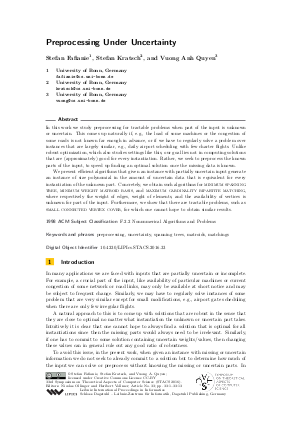Preprocessing Under Uncertainty
Authors Stefan Fafianie, Stefan Kratsch, Vuong Anh Quyen
-
Part of:
Volume:
33rd Symposium on Theoretical Aspects of Computer Science (STACS 2016)
Part of: Series: Leibniz International Proceedings in Informatics (LIPIcs)
Part of: Conference: Symposium on Theoretical Aspects of Computer Science (STACS) - License:
 Creative Commons Attribution 3.0 Unported license
Creative Commons Attribution 3.0 Unported license
- Publication Date: 2016-02-16
File

PDF
LIPIcs.STACS.2016.33.pdf
- Filesize: 0.6 MB
- 13 pages
Document Identifiers
Subject Classification
Keywords
- preprocessing
- uncertainty
- spanning trees
- matroids
- matchings
Metrics
- Access Statistics
-
Total Accesses (updated on a weekly basis)
0Document
0Metadata
Abstract
In this work we study preprocessing for tractable problems when part of the input is unknown or uncertain. This comes up naturally if, e.g., the load of some machines or the congestion of some roads is not known far enough in advance, or if we have to regularly solve a problem over instances that are largely similar, e.g., daily airport scheduling with few charter flights. Unlike robust optimization, which also studies settings like this, our goal lies not in computing solutions that are (approximately) good for every instantiation. Rather, we seek to preprocess the known parts of the input, to speed up finding an optimal solution once the missing data is known. We present efficient algorithms that given an instance with partially uncertain input generate an instance of size polynomial in the amount of uncertain data that is equivalent for every instantiation of the unknown part. Concretely, we obtain such algorithms for minimum spanning tree, minimum weight matroid basis, and maximum cardinality bipartite matching, where respectively the weight of edges, weight of elements, and the availability of vertices is unknown for part of the input. Furthermore, we show that there are tractable problems, such as small connected vertex cover, for which one cannot hope to obtain similar results.
Cite As Get BibTex
Stefan Fafianie, Stefan Kratsch, and Vuong Anh Quyen. Preprocessing Under Uncertainty. In 33rd Symposium on Theoretical Aspects of Computer Science (STACS 2016). Leibniz International Proceedings in Informatics (LIPIcs), Volume 47, pp. 33:1-33:13, Schloss Dagstuhl – Leibniz-Zentrum für Informatik (2016)
https://doi.org/10.4230/LIPIcs.STACS.2016.33
BibTex
@InProceedings{fafianie_et_al:LIPIcs.STACS.2016.33,
author = {Fafianie, Stefan and Kratsch, Stefan and Anh Quyen, Vuong},
title = {{Preprocessing Under Uncertainty}},
booktitle = {33rd Symposium on Theoretical Aspects of Computer Science (STACS 2016)},
pages = {33:1--33:13},
series = {Leibniz International Proceedings in Informatics (LIPIcs)},
ISBN = {978-3-95977-001-9},
ISSN = {1868-8969},
year = {2016},
volume = {47},
editor = {Ollinger, Nicolas and Vollmer, Heribert},
publisher = {Schloss Dagstuhl -- Leibniz-Zentrum f{\"u}r Informatik},
address = {Dagstuhl, Germany},
URL = {https://drops.dagstuhl.de/entities/document/10.4230/LIPIcs.STACS.2016.33},
URN = {urn:nbn:de:0030-drops-57340},
doi = {10.4230/LIPIcs.STACS.2016.33},
annote = {Keywords: preprocessing, uncertainty, spanning trees, matroids, matchings}
}
Author Details
References
- Sepehr Assadi, Sanjeev Khanna, Yang Li, and Val Tannen. Dynamic sketching for graph optimization problems with applications to cut-preserving sketches. CoRR, abs/1510.03252, 2015. URL: http://arxiv.org/abs/1510.03252.
- Dimitris Bertsimas, David B. Brown, and Constantine Caramanis. Theory and applications of robust optimization. SIAM Review, 53(3):464-501, 2011. URL: http://dx.doi.org/10.1137/080734510.
- Marek Cygan. Deterministic parameterized connected vertex cover. In SWAT 2012, volume 7357 of LNCS, pages 95-106. Springer, 2012. URL: http://dx.doi.org/10.1007/978-3-642-31155-0_9.
- George B. Dantzig. Linear programming under uncertainty. Management Science, 50(12-Supplement):1764-1769, 2004. URL: http://dx.doi.org/10.1287/mnsc.1040.0261.
-
Reinhard Diestel. Graph theory (Graduate texts in mathematics). Springer Heidelberg, 2005.

- Stefan Fafianie, Stefan Kratsch, and Vuong Anh Quyen. Preprocessing under uncertainty. CoRR, abs/1510.05503, 2015. URL: http://arxiv.org/abs/1510.05503.
- Michael Hoffmann, Thomas Erlebach, Danny Krizanc, Matús Mihalák, and Rajeev Raman. Computing minimum spanning trees with uncertainty. In STACS 2008, volume 1 of LIPIcs, pages 277-288, 2008. URL: http://dx.doi.org/10.4230/LIPIcs.STACS.2008.1358.
- Stefan Kratsch and Magnus Wahlström. Representative sets and irrelevant vertices: New tools for kernelization. In FOCS 2012, pages 450-459. IEEE Computer Society, 2012. URL: http://dx.doi.org/10.1109/FOCS.2012.46.
- Dániel Marx. A parameterized view on matroid optimization problems. Theor. Comput. Sci., 410(44):4471-4479, 2009. URL: http://dx.doi.org/10.1016/j.tcs.2009.07.027.
- Dániel Marx, Barry O'Sullivan, and Igor Razgon. Finding small separators in linear time via treewidth reduction. ACM Transactions on Algorithms, 9(4):30, 2013. URL: http://dx.doi.org/10.1145/2500119.
- Nicole Megow, Julie Meißner, and Martin Skutella. Randomization helps computing a minimum spanning tree under uncertainty. In ESA 2015, volume 9294 of LNCS, pages 878-890. Springer, 2015. URL: http://dx.doi.org/10.1007/978-3-662-48350-3_73.
-
James Oxley. Matroid Theory. Oxford University Press, 2011.

- Marcin Pilipczuk, Michal Pilipczuk, Piotr Sankowski, and Erik Jan van Leeuwen. Network sparsification for Steiner problems on planar and bounded-genus graphs. In FOCS 2014, pages 276-285. IEEE Computer Society, 2014. URL: http://dx.doi.org/10.1109/FOCS.2014.37.
